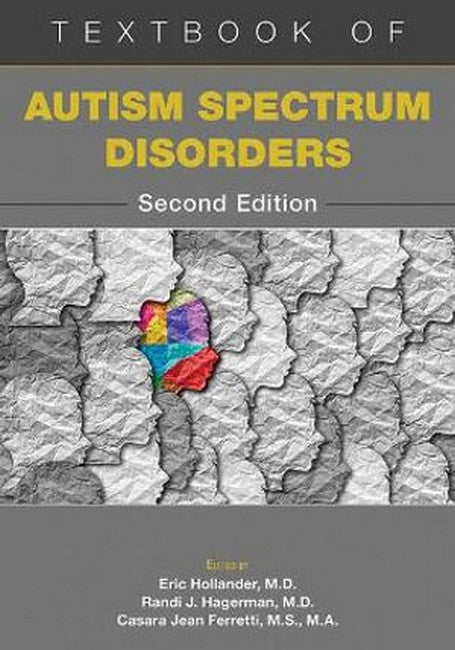Description
PART IAChapter 1. Epidemiology of Autism Spectrum DisordersChapter 2. TBDChapter 3. Pediatric and Neurological AssessmentsChapter 4. Gender Dysphoria, Gender Incongruence, and Sexual IdentityChapter 5. Racial and Ethnic Disparities in Assessment and Evaluation of Autism Spectrum DisorderChapter 6. Digital Biomarkers in Diagnostics and Monitoring of Autism Spectrum DisordersPART IBChapter 7. Social CommunicationChapter 8. Restricted and Repetitive BehaviorsChapter 9. Diet and NutritionPART IIAChapter 10. Genetics and Genomics of AutismChapter 11. EpigenomicsChapter 12. Prenatal, Perinatal, and Parental Risk FactorsChapter 13. Animal Models of Autism Spectrum DisordersChapter 14. Electrophysiological Studies Across ASDsChapter 15. Environmental Toxicity and Immune DysregulationPART IIBChapter 16. Overview of Syndromic Causes of Autism and Commonalities in Neurobiological PathwaysChapter 17. Fragile X Syndrome and Associated DisordersChapter 18. Tuberous Sclerosis ComplexChapter 19. 16p11.2 and Other Recurrent Copy Number Variants Associated With Autism SusceptibilityChapter 20. Rett SyndromeChapter 21. Prader-Willi SyndromePART IICChapter 22. Neuroanatomical Findings in Autism Spectrum DisordersChapter 23. The Amygdala in Autism Spectrum DisordersChapter 24. Neurobiology of ASD Informed by Structural Imaging ResearchChapter 25. Positron Emission TomographyChapter 26. Functional Magnetic Resonance ImagingPART IIIAChapter 27. Serotonergic Medication in Autism Spectrum Disorder (ASD)Chapter 28. AntipsychoticsChapter 29. Treating Hyperactivity in Children With Pervasive Developmental DisordersPART IIIBChapter 30. Complementary and Integrative ApproachesChapter 31. Experimental Therapeutics: OxytocinChapter 32. VasopressinChapter 33. N-AcetylcysteineChapter 34. Arbaclofen: From Animal Models to Clinical Trials in AutismChapter 35. Cannabis, Cannabinoids, and Immunomodulatory AgentsPART IIICChapter 36. Behavioral Treatments for Autism Spectrum DisorderChapter 37. Early Start Denver ModelChapter 38. The Developmental, Individual Difference, Relationship-Based Intervention Model: A Comprehensive Parent-Mediated ApproachChapter 39. Autism Interventions in Schools Mediated by Teachers, Paraprofessionals, and PeersChapter 40. Language and Communication Challenges and Treatments in Autism Spectrum DisorderPART IIIDChapter 41. Transcranial Magnetic StimulationChapter 42. Stem Cell and Gene Therapy for Autism Spectrum DisordersChapter 43. Gene Therapy and Molecular InterventionsPART IVChapter 44. ConsortiumsChapter 45. Employment and Life OutcomesChapter 46. Autism Strengths and NeurodiversityChapter 47. Role of Patient Advocacy Groups in Treatment Development
ric Hollander, M.D., is Clinical Professor of Psychiatry and Behavioral Sciences and Director of the Compulsive, Impulsive, and Autism Spectrum Disorders Program at the Albert Einstein College of Medicine and the Montefiore Medical Center, Bronx, New York. Previously, he was Esther and Joseph Klingenstein Professor and Chairman of Psychiatry and Director of the Seaver and New York Autism Center of Excellence at Mount Sinai School of Medicine.Alex Kolevzon, M.D., is Associate Professor of Psychiatry and Pediatrics and Clinical Director of the Seaver Autism Center for Research and Treatment in the Department of Psychiatry at Mount Sinai School of Medicine in New York, New York.Joseph T. Coyle, M.D., is the Eben S. Draper Professor of Psychiatry and Neuroscience at Harvard Medical School. Previously, he served as the Distinguished Service Professor of Child and Adolescent Psychiatry at Johns Hopkins School of Medicine in Baltimore, Maryland.

